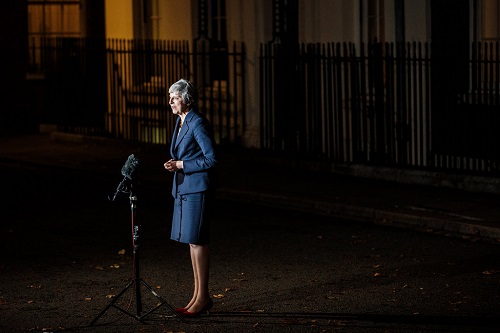flickr photo
By
Tom Arms
Theresa May is a frightened woman.
She is not frightened by the pile of Conservative MPs’ letters demanding her departure. They are still a long way from the 48 required. And even if it reaches the magic number, the bookies are betting on Mrs May retaining the leadership in any consequent vote.
Even if she loses, Theresa May can take solace from Enoch Powell’s truism that all political careers end in failure and that her successor will be faced with the same brick wall of insoluble Brexit problems as she was.
Neither is Mrs May worried about Spain’s latest sabre rattling over Gibraltar. She is confident that Brussels can pull Madrid into line with a sidebar letter or a slight tweaking of the Brexit agreement.
The unravelling of the prime minister’s de facto coalition with the Democratic Unionist Party is a concern. But it was never more than an inconvenient marriage of convenience based on a foundation of contradictions. Northern Ireland voted to remain. The majority want the benefits of Europe which include good relations with Dublin and peace on their island. The DUP exists for one purpose only: the perpetuation of the Protestant Ascendancy in Northern Ireland. This puts it in complete opposition to the majority Northern Irish vote in the Brexit referendum.
Mrs May can deal with the above. Or if she can’t the results of failure would not be so catastrophic that her legacy would be tarnished beyond repair.
Theresa May is frightened of two other outcomes: No deal or a second referendum. Unfortunately for her, it is looking increasingly likely that the final choice will be between those two options.
No deal is a cliff edge over which only the most ardent Brexiteers are prepared to jump. No one can say with absolute certainty what lies at the bottom of the cliff. And it is this fear of the unknown that is dragging MPs away from the precipice and back towards the unpalatable certainty that Mrs May’s bad deal is better than no deal.
Then there is the second referendum, aka “The People’s vote.” The option refuses to go away despite the efforts of both Jeremy Corbyn and Mrs May to rule it out. It continues to lurk in the shadows and is gaining ground as the likelihood of a parliamentary deadlock looms. But another referendum is also clouded with uncertainty and littered with pitfalls.
What would be the wording on the ballot paper? Would it be another binary choice: Remain or the current deal, remain or no deal, or no deal or current deal? Any one of those options would badly split the already fractured Conservative and Labour parties and probably lead to an unpredictable seismic shift in the British political fabric.
The latest poll of polls shows that the British people remain hopelessly divided on the issue of EU membership. As of November 20, forty-seven percent of those polled think Britain was wrong to vote to leave Europe, 41 percent remain convinced that it was the right move and 12 percent are sitting on the fence. Furthermore, the trend over the last two and a bit years shows very little movement with just slight variations as the remain and leave camps alternate in the lead position. The British political landscape has come to resemble the trench warfare of World War I.
Theresa May is rightly concerned about the uncertain dangers of moving the decision-making process out of the relatively civilised debating chambers of parliament into the emotionally charged streets. MPs are—for the most part—respectful of the confining parameters of the British constitution which insures respect for the rule of law. The man in the street –convinced of the overwhelming justice of his beliefs—fails to recognise the same restrictions.
I am glad that I am not prime minister.
Tom Arms
I am a journalist, entrepreneur and historian with extensive experience in print, web and broadcast journalism. I started as a diplomatic correspondent, wrote several books (The Falklands Crisis, World Elections On File and the Encyclopedia of the Cold War), and then in 1987 started my own business (Future Events News Service, www.fensinformation.com) which over 25 years established itself as the world and UK media’s diary. Our strapline was: “We set the world’s news agenda.” I sold FENS in December 2012 but retained the exclusive broadcast rights to all of FENS data. To exploit these rights I set up LookAhead TV which produces unique programmes which “Broadcasts Tomorrow Today” so that viewers can “Plan to Participate.” LookAhead has appeared regularly on Vox Africa, Radio Tatras International, The Conversation and Voice of Africa Radio.
In addition to being a syndicated broadcaster and columnist on global affairs, Tom is also available for speaking engagements and can be contacted on Twitter, Linkedin and email: [email protected].



No Comments Yet!
You can be first to comment this post!